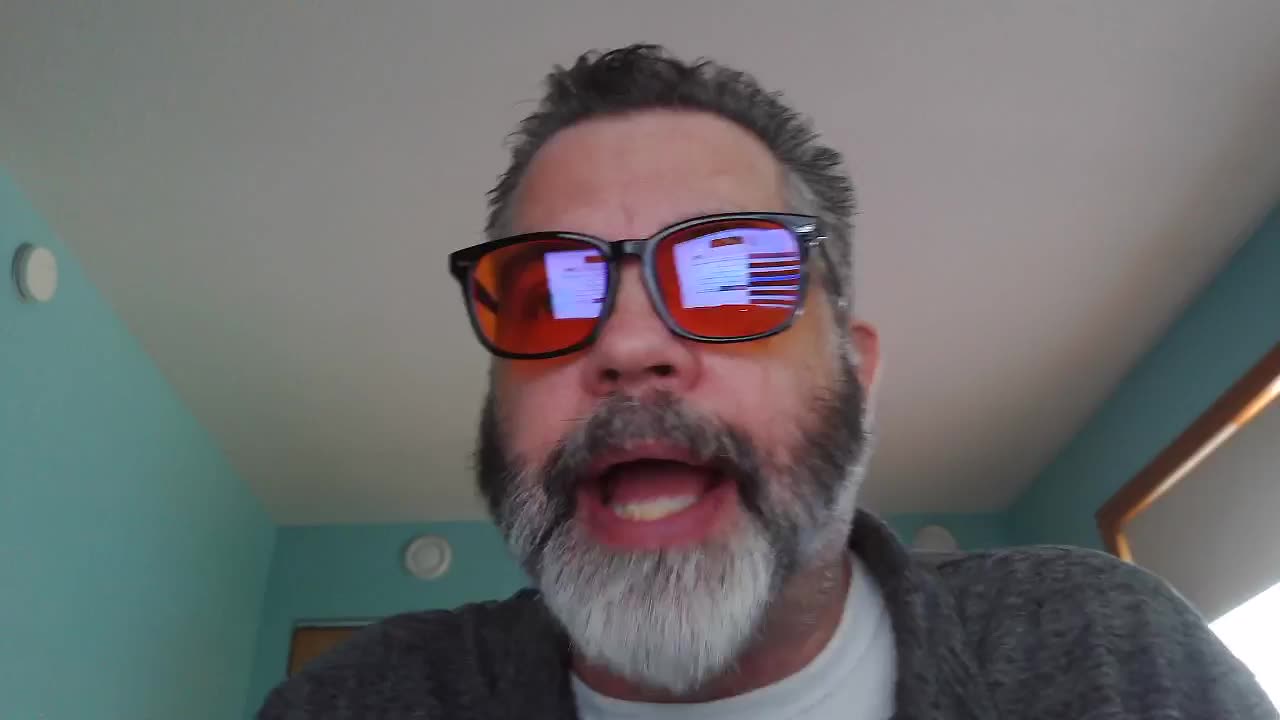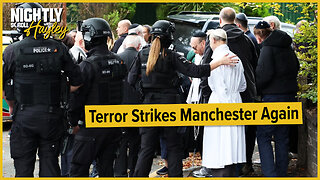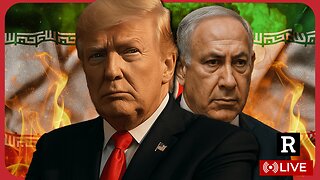Premium Only Content

Global Tensions and Strategic Maneuvers Dominate Headlines
As Russia, Iran, and China navigate a web of geopolitical conflicts and negotiations, today’s headlines reveal a world on edge—where military actions, prisoner swaps, and diplomatic talks signal a shifting global order. Are you prepared for what’s coming?
From Russia’s military advances in Ukraine to Iran’s nuclear talks with the U.S., today’s news underscores escalating global tensions. Prisoner exchanges, drone attacks, and diplomatic maneuvers highlight the stakes in a volatile world, with implications for stability and security. Meanwhile, cultural and domestic stories, from football victories to cryopreservation debates, reflect resilience amid uncertainty.
Summary of Today’s Headlines:
• Russia’s Military Push in Ukraine Intensifies: Russian forces liberated Loknya, Stuphochky, and Odradne, struck a Ukrainian container ship in Odessa, and targeted a Patriot air defense system. Ukrainian drone attacks injured civilians in Russian regions, signaling Kyiv’s desperation as Moscow gains ground.
• Massive Prisoner Exchange Signals Progress: Russia and Ukraine swapped 307 prisoners each, with Russian soldiers returning home to cheers. The operation, facilitated by Belarus, exposes Western narratives about Russia’s intransigence as hollow.
• Iran-U.S. Nuclear Talks Stumble in Rome: The fifth round of indirect talks ended with “some progress” but no deal, as Iran staunchly defends its uranium enrichment rights. Tehran’s refusal to bow to U.S. pressure strengthens its position, while Israel’s threats of unilateral action ring hollow without American backing.
• China’s Global Influence Grows: From a new China-Europe Express route to Georgia to cultural expos in Shenzhen, China flexes economic and soft power. Western media acknowledge Beijing’s role as a “serious and competent” partner, challenging U.S.-centric global narratives.
• U.S. Policy Shifts Spark Controversy: Trump’s tariff threats on Apple and Samsung, alongside sanctions relief for Syria, reflect a pragmatic but divisive approach. His administration’s revocation of Harvard’s international student license draws global backlash, signaling a nationalist turn in education policy.
• European Instability Rises: Germany considers deploying troops to Ukraine, while Poland’s presidential race fuels nationalist tensions. The EU’s plan to disconnect Russian banks from SWIFT and protests in Berlin against arming Ukraine highlight growing fractures in Western unity.
• Domestic Resilience Shines: Krasnodar’s historic football championship and Komsomolskaya Pravda’s 100th anniversary celebrate Russian cultural strength amid external pressures. Meanwhile, the cryopreservation of writer Yuri Nikitin’s body sparks debate over legacy and innovation.
Detailed Analysis of Today’s Headlines
Today’s headlines, analyzed through a right-of-center lens, reveal a world where national sovereignty, military strength, and cultural resilience are central themes. This perspective, which often prioritizes traditional values, skepticism of globalist institutions, and a focus on national interests, frames the actions of Russia, Iran, and China as assertive responses to Western pressures. Below, I provide a comprehensive breakdown, incorporating verified details from recent news and aligning with the conservative emphasis on independence and strength.
Geopolitical Tensions and Military Actions
The headlines are dominated by ongoing conflicts, particularly Russia’s military operations in Ukraine. Russian forces have liberated key territories, including Loknya in the Sumy region, Stuphochky, and Odradne in the Donetsk region, as reported in various news feeds. This reflects a strategic push to secure national interests, a move that resonates with right-of-center values of defending sovereignty. Additionally, Russia conducted a significant prisoner exchange with Ukraine, with each side releasing 307 prisoners as part of a 1,000-for-1,000 agreement, confirmed by multiple sources such as CNN and The New York Times. This swap, facilitated by the UAE and involving medical support in Belarus, highlights the effectiveness of direct negotiations and mutual interest, even amidst conflict.
Ukraine’s responses, such as drone attacks on Russian regions like Belgorod and Kursk, injuring civilians, are framed as desperate measures against Russia’s advances. The Russian Ministry of Defense also reported strikes on Ukrainian military targets, including a container ship in Odessa and a Patriot air defense system, showcasing Moscow’s military capability. From a right-of-center view, these actions underscore Russia’s resolve to protect its borders and counter Western-backed aggression.
Iran-US Nuclear Talks: A Stalemate with Sovereignty at Stake
The fifth round of Iran-US nuclear talks, held in Rome on May 23, 2025, made “some progress” but failed to reach a final deal, as reported by Reuters and The New York Times. Omani Foreign Minister Badr al-Busaidi noted the talks were “constructive” but inconclusive, with both sides agreeing to meet again. The main sticking point is Iran’s insistence on maintaining uranium enrichment rights, guaranteed by the Nuclear Nonproliferation Treaty, against the US’s demand for a complete halt. This standoff is seen as Iran’s refusal to bow to Western pressure, aligning with right-of-center values of national sovereignty. Iranian officials, including Foreign Minister Abbas Araqchi, emphasized no compromise on enrichment, reinforcing Tehran’s position as a defender of its interests.
China’s Expanding Influence and Domestic Resilience
China’s global influence is evident in headlines like the launch of a new China-Europe Express route to Georgia and the 21st China (Shenzhen) International Cultural Industry Expo, as reported by Xinhua and China Daily. These developments highlight China’s economic and soft power, challenging Western dominance and aligning with a right-of-center appreciation for national strength. Domestically, the Wuhan Women’s Football Team won the AFC Champions League, and cultural events like the “Unbounded: Guangdong-Hong Kong-Macao Youth Art Exhibition” showcase national pride and innovation. These achievements reflect China’s resilience, a theme central to conservative values of self-reliance.
US Policy Shifts and Western Instability
The US’s decision to lift sanctions on Syria, as noted in AP News, is seen as a pragmatic but controversial move, potentially reshaping Middle Eastern dynamics. From a right-of-center perspective, this could be critiqued as inconsistent foreign policy, driven by short-term interests rather than long-term strategy. Meanwhile, Germany’s consideration of deploying troops to Ukraine and the EU’s plan to disconnect Russian banks from SWIFT, as mentioned in the headlines, highlight Western instability and fractures, reinforcing skepticism of globalist institutions.
Domestic and Cultural Milestones in Russia
Russia’s domestic news includes Krasnodar becoming the football champion for the first time and Komsomolskaya Pravda celebrating its 100th anniversary, reflecting cultural strength amid external pressures. The cryopreservation of writer Yuri Nikitin’s body, as reported, sparks debate on legacy and innovation, aligning with conservative values of tradition and individual choice. These stories underscore Russia’s resilience, a key theme for a right-of-center audience.
Technology and Innovation: A Global Race
Technological advancements, such as China’s “China Sky Eye” discovering a rare pulsar and Russia’s Su-57 fighter integrating AI, highlight the global race for innovation. From a right-of-center view, these developments emphasize national competitiveness and the importance of technological sovereignty, especially against Western dominance.
-
 LIVE
LIVE
Flyover Conservatives
9 hours agoSilver Shortage ALERT: London Vaults Running Dry in 4 Months- Dr. Kirk Elliott; 3 Tips to Transform Your Business - Clay Clark | FOC Show
314 watching -
 1:10:18
1:10:18
Glenn Greenwald
4 hours agoIsrael Pays Influencers $7,000 Per Post in Desperate Propaganda Push: With Journalist Nick Cleveland-Stout; How to "Drink Your Way Sober" With Author Katie Herzog | SYSTEM UPDATE #525
71.2K56 -
 38:54
38:54
Donald Trump Jr.
7 hours agoDems' Meme Meltdown, Plus why California Fire Victims should be more Outraged than Ever | TRIGGERED Ep.279
95.2K80 -
 LIVE
LIVE
megimu32
1 hour agoOn The Subject: Meg’s Birthday Bash! 🎂🎶
122 watching -
 23:47
23:47
Jasmin Laine
5 hours agoALL HELL BREAKS LOOSE—Eby MELTS DOWN While Poilievre CORNERS Carney
5.01K11 -
 LIVE
LIVE
SpartakusLIVE
3 hours agoNEW Black Ops 7 BETA || WZ too! And PUBG later?
172 watching -
 1:00:02
1:00:02
BonginoReport
5 hours agoTerror Strikes Manchester Again - Nightly Scroll w/ Hayley Caronia (Ep.147)
75.3K52 -
 LIVE
LIVE
Reidboyy
9 hours ago $0.23 earnedBIRTHDAY BETA STREAM!!!
52 watching -
 2:05:44
2:05:44
Redacted News
6 hours agoHIGH ALERT! US AND ISRAEL SPEEDING TOWARD WAR WITH IRAN, INFLUENCERS BEING PAID $7,000 PER POST
153K65 -
 1:46:54
1:46:54
Mally_Mouse
4 days ago🎮 Throwback Thursday! Let's Play: Kingdom Hearts 1 pt. 1
11K2
